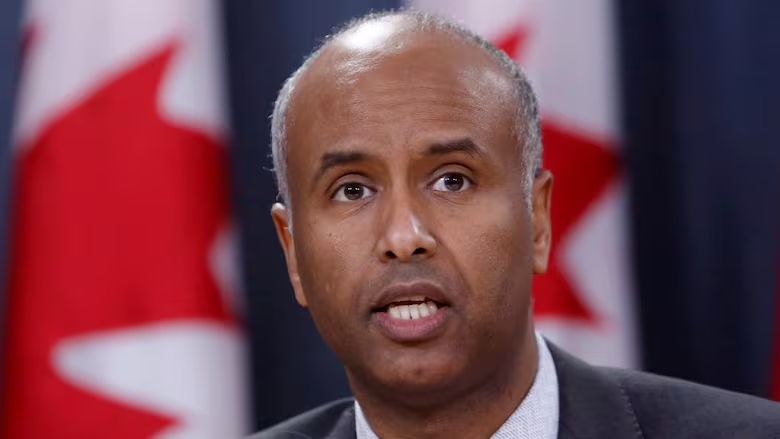Canadian officials to counter 'incomplete' information in flyers with tips on illegal border crossing
Immigration Minister Ahmed Hussen says pamphlets don't paint accurate picture of Canada's asylum system

Immigration Minister Ahmed Hussen says officials will reach out to counter "incomplete" misinformation being circulated in New York state offering instructions to asylum seekers on how to illegally cross the border into Canada, as political pressure mounts for government to do more to address the influx of irregular migrants from the United States.
Pamphlets produced by a group called Plattsburgh Cares are being circulated in Plattsburgh, N.Y., giving would-be asylum seekers step-by-step instructions on where to cross the border, how to contact immigration lawyers and what to tell border security officials during interviews.
The pamphlets even include details about how much migrants should expect to pay in taxi fare to the unofficial border crossing at Roxham Road in Quebec.
"Part of this humanitarian mission includes providing basic, non-legal information so people will know how to obtain the legal and other supports they need to make optimal choices for themselves and their families," a group spokesperson said in a written statement.
The organization's website says its efforts were spurred by racist messages on social media and flyers in the community that had left some feeling threatened.
Hussen said Thursday his department has reached out to the group and that the Canadian consul-general in New York will address what he says is misinformation in the pamphlets.
"The contents of the flyer are incomplete, they don't really paint an accurate picture of our asylum system and it's unfortunate, because people will rely on this," Hussen said.
"That's why our outreach campaign that has been ongoing is really important to give people the real information about Canada's systems."
This comes on a day Hussen was already set to face pointed questions about the ongoing surge in migrants entering the country through unofficial entry points and the pressures this is creating on the country's immigration system.
The minister will face a four-hour grilling in the House of Commons as part of an examination of his department's budget Thursday evening, but Opposition MPs are expected to focus on the border crosser issue.
Close 'loophole'
Conservative immigration critic Michelle Rempel says she believes the only answer is to close a loophole that exists in the Canada-U.S. Safe Third Country Agreement, which is believed to be a major factor in the spike of irregular border crossings, or designate the entire border an official port of entry.
"Until the ability for people to illegally cross the border into the Canada from the United States and claim asylum is rectified, all that you will hear for months and years on end is the demand for hundreds of millions of dollars to be poured into strained social systems to support unplanned, disorderly immigration," Rempel said.
If left unchecked, Rempel believes the influx could lead to a flip in public support for immigration overall.
"We have this wonderful thing in Canada where people do not question immigration, they celebrate immigration. But because this is going to continue to happen, people are going to start questioning that."
The influx of refugee claimants has been an ongoing pressure point notably in Quebec for the last few months. The RCMP intercepted 7,612 refugee claimants between January and April of this year at non-official ports of entry and officials are bracing for an even bigger spike over the warm summer months.
Plans are now underway in Toronto to convert college residences into temporary shelters; tent shelters will be set up in Quebec for asylum seekers and the Canada Border Services Agency is diverting staff to Quebec for the summer in anticipation of a spike in irregular migrants this summer.
The majority of those who have arrived in Canada irregularly so far this year have been Nigerian, many of whom travelled to the U.S. with a tourist visas in order to then come to Canada and claim refugee status. As part of an ongoing outreach campaign to get out the message that crossing the border irregularly is not a free ticket to Canada, Hussen travelled to Nigeria last week to speak directly to Nigerians.
That effort will continue, he said.
As for requests for financial assistance from the province of Quebec and the city of Toronto to help cover logistical costs, Hussen said those discussions are also still underway, including on finding ways to divert asylum seekers away from congested cities.
Welcoming tweet to blame?
"The federal government is seized on this and we will do what we can to work with (Ontario and Quebec) as they deal with this," he said.
"We have to make sure we get it right."
Rempel says she blames Prime Minister Justin Trudeau for his January 2017 tweet welcoming migrants to Canada, which she says was merely an attempt to grab headlines by contrasting him with President Donald Trump.